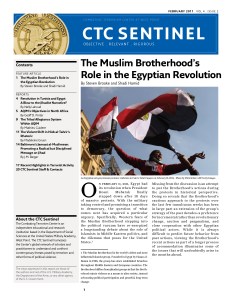Cover Story Overview
The Muslim Brotherhood’s Role in the Egyptian Revolution
On February 11, 2011, Egypt had its revolution when President Hosni Mubarak finally stepped down after 18 days of massive protests. With the military taking control and promising a transition to democracy, the question of what comes next has acquired a particular urgency. Specifically, Western fears of the Muslim Brotherhood stepping into the political vacuum have re-energized a longstanding debate about the role of Islamists in Middle Eastern politics, and the dilemma that poses for the United States. Missing from the discussion is an attempt to put the Brotherhood’s actions during the protests in historical perspective. Doing so reveals that the Brotherhood’s cautious approach to the protests over the last few tumultuous weeks has been in large part an extension of the group’s strategy of the past decades: a preference for incremental rather than revolutionary change, caution and pragmatism, and close cooperation with other Egyptian political actors.
 Skip to content
Skip to content

